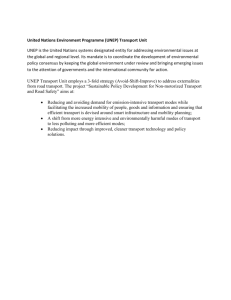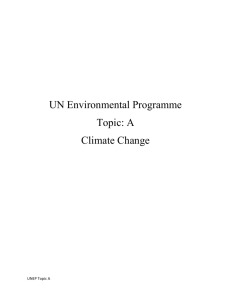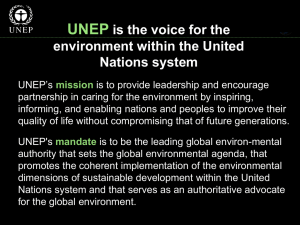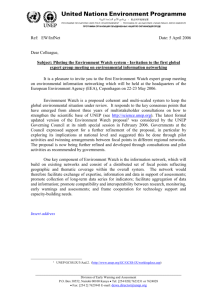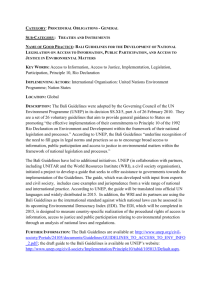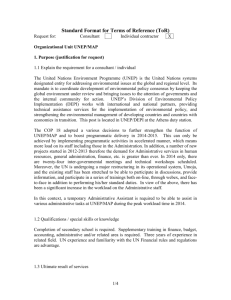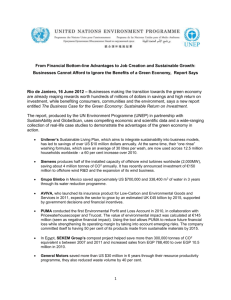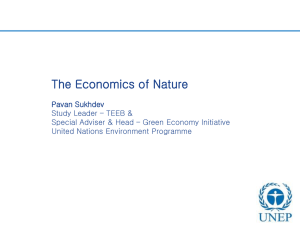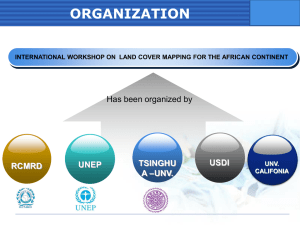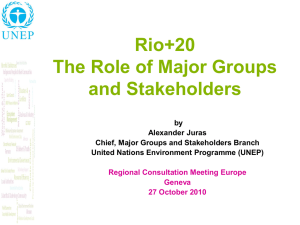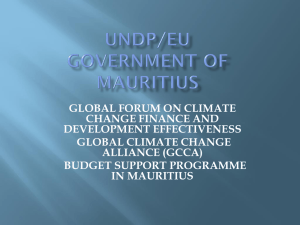UNEP Launches Global Initiative for Resource Efficient Cities
advertisement
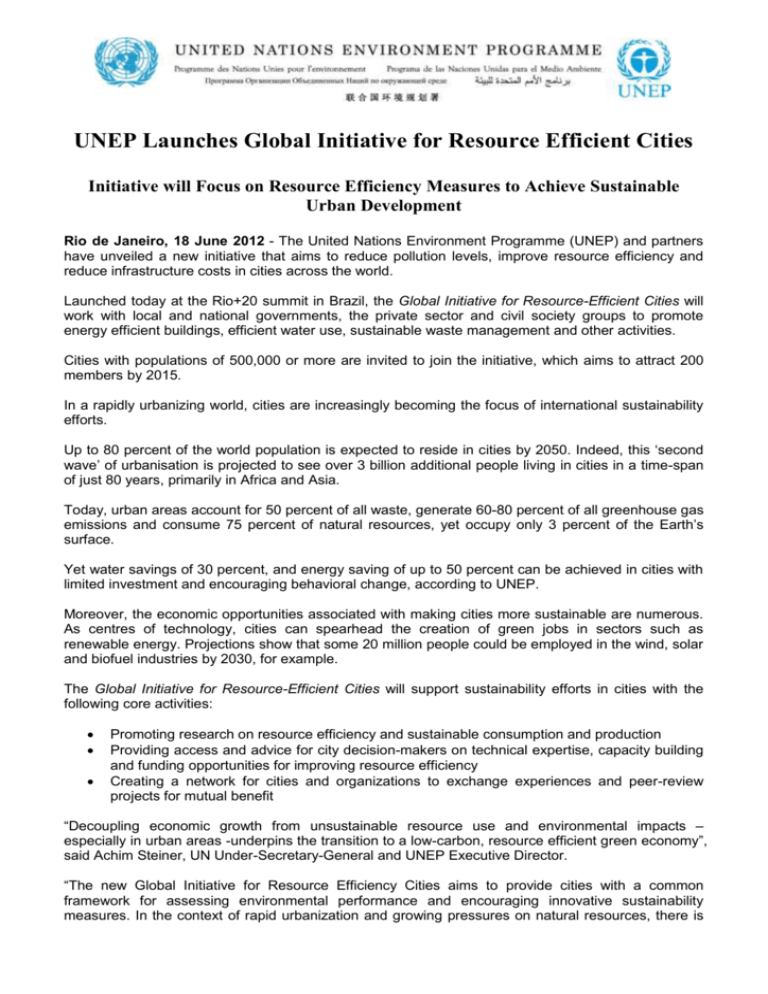
UNEP Launches Global Initiative for Resource Efficient Cities Initiative will Focus on Resource Efficiency Measures to Achieve Sustainable Urban Development Rio de Janeiro, 18 June 2012 - The United Nations Environment Programme (UNEP) and partners have unveiled a new initiative that aims to reduce pollution levels, improve resource efficiency and reduce infrastructure costs in cities across the world. Launched today at the Rio+20 summit in Brazil, the Global Initiative for Resource-Efficient Cities will work with local and national governments, the private sector and civil society groups to promote energy efficient buildings, efficient water use, sustainable waste management and other activities. Cities with populations of 500,000 or more are invited to join the initiative, which aims to attract 200 members by 2015. In a rapidly urbanizing world, cities are increasingly becoming the focus of international sustainability efforts. Up to 80 percent of the world population is expected to reside in cities by 2050. Indeed, this ‘second wave’ of urbanisation is projected to see over 3 billion additional people living in cities in a time-span of just 80 years, primarily in Africa and Asia. Today, urban areas account for 50 percent of all waste, generate 60-80 percent of all greenhouse gas emissions and consume 75 percent of natural resources, yet occupy only 3 percent of the Earth’s surface. Yet water savings of 30 percent, and energy saving of up to 50 percent can be achieved in cities with limited investment and encouraging behavioral change, according to UNEP. Moreover, the economic opportunities associated with making cities more sustainable are numerous. As centres of technology, cities can spearhead the creation of green jobs in sectors such as renewable energy. Projections show that some 20 million people could be employed in the wind, solar and biofuel industries by 2030, for example. The Global Initiative for Resource-Efficient Cities will support sustainability efforts in cities with the following core activities: Promoting research on resource efficiency and sustainable consumption and production Providing access and advice for city decision-makers on technical expertise, capacity building and funding opportunities for improving resource efficiency Creating a network for cities and organizations to exchange experiences and peer-review projects for mutual benefit “Decoupling economic growth from unsustainable resource use and environmental impacts – especially in urban areas -underpins the transition to a low-carbon, resource efficient green economy”, said Achim Steiner, UN Under-Secretary-General and UNEP Executive Director. “The new Global Initiative for Resource Efficiency Cities aims to provide cities with a common framework for assessing environmental performance and encouraging innovative sustainability measures. In the context of rapid urbanization and growing pressures on natural resources, there is an urgent need for co-ordinated action on urban sustainability. This is essential both for preventing irreversible degradation of resources and ecosystems, and for realizing the multiple benefits of greener cities, from savings through energy-efficient buildings, or the health and climate benefits of cleaner fuels and vehicles.” The initiative has already been backed by a broad range of international institutions, such as UNHabitat, World Bank, United Cities and Local Governments (UCLG), Local Governments for Sustainability (ICLEI), Cities Alliance, International Federation of Consulting Engineers (FIDIC), Veolia Environment Institute, Bioregional, Urban Environmental Accords Members Alliance and International Institute for Environment and Development (IIED). Several cities have also quickly come on board, including the City of Sao Paulo (TBC), Copenhagen (TBC), Malmo (TBC), Gwangju, with national interest having been expressed by Japan and the United States. “The strong, early interest in this initiative is further evidence that cities, which generate 80 per cent of global GDP, understand they are the key decision-makers and implementers of the necessary steps required to move our societies towards a more sustainable pattern of consumption and production,”said David Miller, former mayor of Toronto and past chair of the C40 Cities Climate Leadership Group. Sustainable Cities: Making it Happen The practical steps that cities can take towards resource efficiency are the focus of a new UNEP report, also launched today at Rio+20. Using case studies from China, Brazil, Germany and a host of other countries, Sustainable, Resource Efficient Cities in the 21st Century: Making it Happen, highlights opportunities for city leaders to improve waste and water management, energy efficiency, urban transportation, and other key sectors. Among the projects highlighted in the report is the Masdar City development in the United Arab Emirates, which is acting as a test-bed for the development of the skills, innovation and markets required for realizing the eco-city concept at a large scale. The report also examines several initiatives that aim to meet the rising energy demands of urban centres, in a sustainable way. Renewable energy feed-in tariff strategies in Germany, for example, have allowed the city of Freiburg to invest in photovoltaic, wind and other renewable energy systems, which now supply over 8 percent of the city’s total energy demand. Household energy consumption has been decreased by up to 80 percent due to Freiburg’s energy-efficient housing standards. Overall, the UNEP report outlines several success factors for transitioning to sustainable, resource efficient cities: Integration: Cities need to move beyond merely conducting environmental impact assessments before implementing new developments. In addition to a conservation approach towards greening, the livability of cities and social equality measures should be taken into account. Governance: Tackling climate change and advancing urban sustainability requires an integrated, consultative approach involving local communities and civil society groups, as well traditional decision-makers. Smart Urban Design: Supporting low-footprint design that targets public transport, pedestrian zones and cycle lanes and promote compact, multi-use urban development Finance: Tax incentives and subsidies can be used to stimulate the up-take of green technologies. Technology Transfer: Transfer of technology and skills to developing countries should be adapted to suit local context, not simply ‘off-the-shelf’ solutions from the developed world. Capacity building on management and maintenance is an important part of technology and skills transfer. Innovation: Supporting and/or establishing educational and research bodies that can support the development of skills, capabilities and networks on urban sustainability A second UNEP report, also launched today, examines how cities can better access climate finance through the Clean Development Mechanism (CDM). The Feasibility Study on the Development of an Urban CDM, recommends reforming the existing CDM to allow for methodologies geared towards cities. It also recommends the development of a CDM programme of activities for pilot cities that would inform the future development of Nationally Appropriate Mitigation Actions and assist in the transition to a green economy. Notes to Editors More information on the Global Initiative http://www.unep.org/pdf/GI-REC_4pager.pdf for Resource-Efficient Cities is available at: Full copies of the UNEP reports Sustainable, Resource Efficient Cities in the 21st Century: Making it Happen, and A Feasibility Study on the Development of an Urban CDM are available at: http://www.unep.org/urban_environment/Publications/index.asp For more, information, please contact: Nick Nuttall, Acting Director, UNEP Division of Communication and Public Information and Spokesperson, Tel: +55 11 6593 8058 / +254 733 632755, E-mail: nick.nuttall@unep.org Bryan Coll, UNEP Newsdesk (Nairobi), Tel. +254 731 666 214, E-mail: unepnewsdesk@unep.org Moira O'Brien-Malone, Head, DTIE Communications, UNEP Paris, Tel. + 33 1 44 37 76 12 / +33 6 82 26 93 73, E-mail: moira.obrien-malone@unep.org
